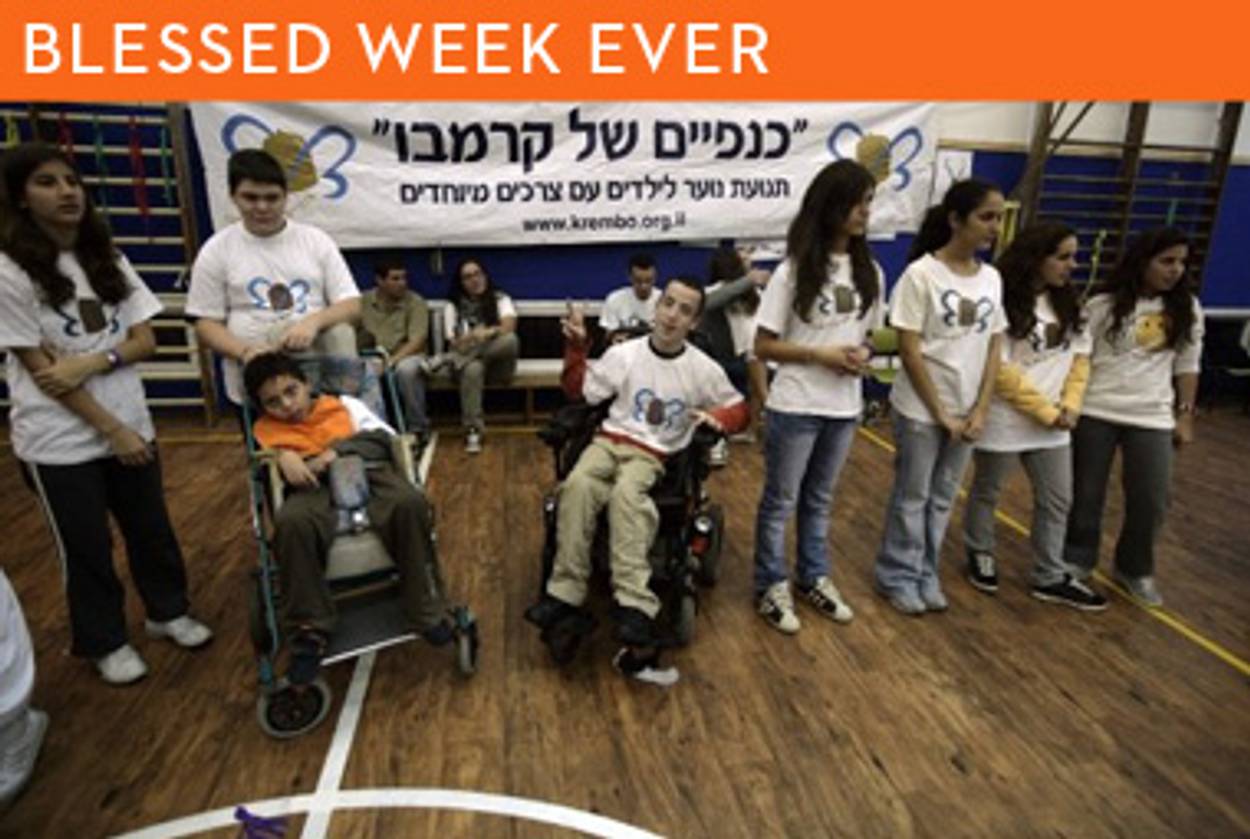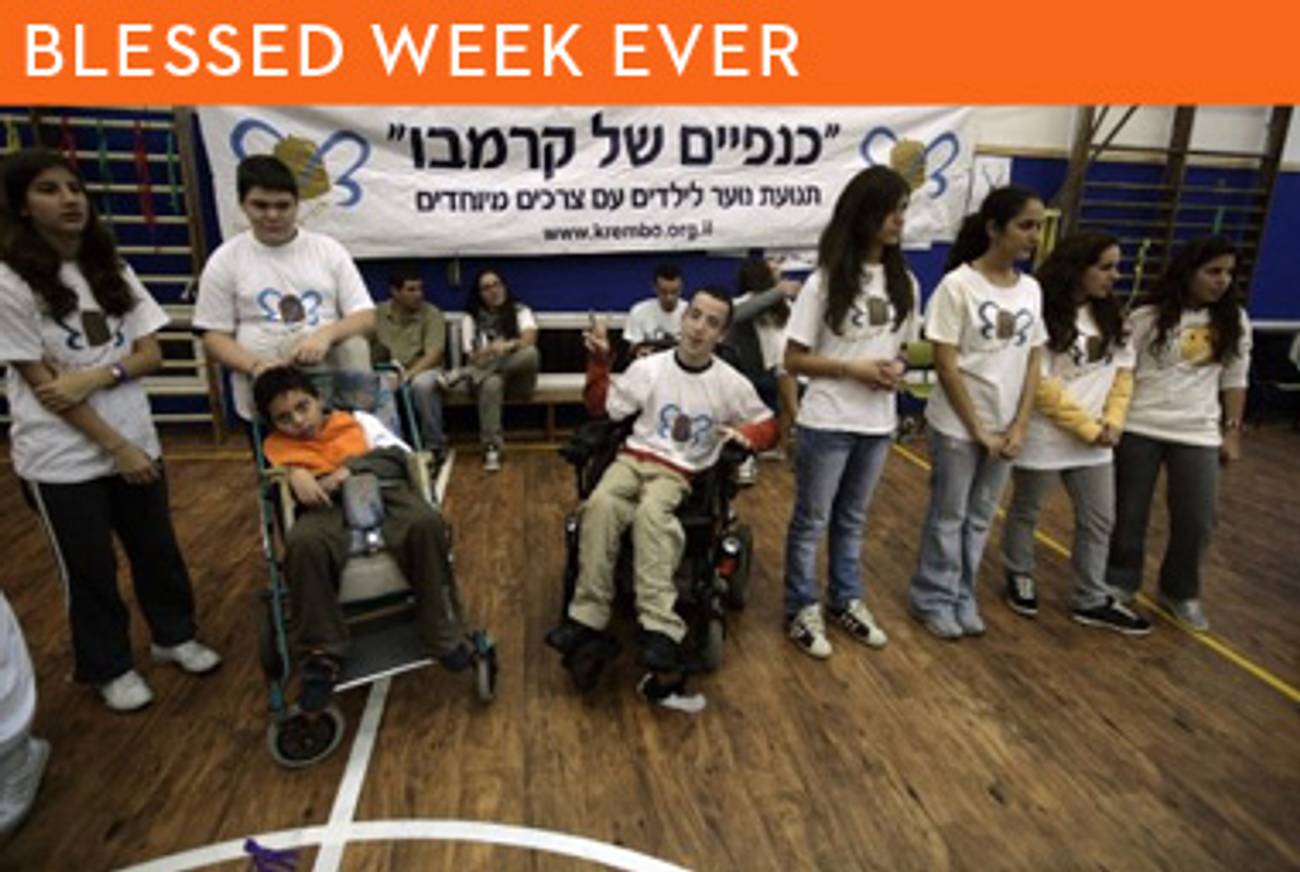The Enabler
Stories of Abraham, the original outsider, and a young Israeli activist who followed his lead




When she was 11 years old, Adi Altschuler saw an ad on TV. In it, a sweet looking girl—Adi thought she was about the same age as herself—stared dolefully at the screen. Zooming out, the camera revealed the sad truth: The girl was handicapped. A deep voice came on and asked for volunteers or donations. Adi was moved. She wanted to be that girl’s friend.
The next day, she called the number she had seen on the screen, which turned out to be the hotline of the Israel Foundation for Handicapped Children. I want to be friends with the girl on TV, Adi told the person on the other end of the line, and then she listened patiently as the volunteer told her that the girl on TV already had many friends but that there were a lot of other handicapped children who were terribly lonely and could use someone to play with. Adi agreed to mentor one of them. It won’t take much, the volunteer on the other end of the line promised, just an hour a week of basic human contact.
Before she met her new friend for the first time, one of the foundation’s staff members met with Adi and told her to expect the worst. The boy, a toddler named Kfir, could neither walk nor talk, and he needed help to complete even the most rudimentary tasks. Spending time with him, the staffer said, might be difficult. Shaken, Adi knocked on Kfir’s door.
“It was like in the movies,” she says of that first meeting. “All I could see was a huge smile, ear to ear, and a million freckles, and a charming child who smiled and laughed constantly.”
Soon, the weekly hour stretched into two, then three, then four. Her presence, Adi noticed, gave Kfir something to look forward to—he had no social life to speak of and was engaged in no other extracurricular activities—but it also allowed his mother a few hours of relief and some time to herself. Before too long, Adi started referring to Kfir as her little brother and embracing his family as her own.
Now in high school, Adi decided to fill the rest of her free time by joining a youth movement. Out of the approximately 1.6 million Israelis who are 18 or younger, more than 175,000 belong to various youth organizations, one of the highest rates in the Western world. These movements vary in ideology and style, but all share a profound commitment to working toward social justice and civic involvement.
Adi was stirred by her experience in the movement, but also deeply troubled. While she was having a meaningful and enjoyable time with her friends, Kfir, she knew, couldn’t join in the activities. For all their good will, most Israeli youth movements reject children and teenagers with severe disabilities, arguing that the groups lack the training and the facilities to accommodate these special needs. That, Adi thought, was an excuse. All one really needed, as the battered trope goes, was love.
And so, at 15, Adi did the only thing she could think of: She started a youth movement of her own. And she gave it the first name that came to mind: Krembo Wings.
The Krembo, for those readers uninitiated in the wonders of Israeli snackdom, is a treat consisting of a biscuit topped with airy whipped marshmallow and coated with chocolate. It’s what Mallomars secretly wish they could be. It’s also the quintessential treat for Israeli children. And wings, Adi thought, symbolized hope.
The new movement, Adi thought, should do for handicapped children what she was able to do for Kfir. But it should also allow kids like Kfir to feel as if they were a part of the community, giving them the option to take part in the usual youth-movement volunteer activities. If a handicapped child and a non-handicapped child painted the school’s fence together, say, or cleaned up the local park, several things would happen, Adi argued—the handicapped kid would feel useful and empowered, his healthy peers would overcome whatever trepidation they might have had about the disabled, and the community at large would look on and realize that even its most unfortunate members can, when given a chance, give something back and play a part.
It was a winning argument. Young Israelis—disabled and not—signed up faster than Adi could handle them. She got in touch with municipalities, organized car services for the neediest children, roped in parents and teachers, secured a space to meet. Her enthusiasm and commitment were infectious. Today, eight years later, Krembo Wings has 10 regional branches across Israel, serving the needs of more than a thousand children. That number continues to grow.
One reason for the demand, Adi told me recently, had to do with technology. While the Internet has been a terrific fundraising tool for the movement—one member’s Facebook plea for donations went viral in Israel and raised tens of thousands of shekels virtually overnight—it also underscores the growing gap between non-handicapped and handicapped children. While the former spend more and more of their free time communicating with friends via social media, email or text messages, the latter—many of whom cannot see or hear or type—remain increasingly shut out of the digital cornucopia.
Their predicament is one we, following Adi’s example, should keep in mind and take to heart. As we do, we may take comfort in thinking about Abraham, the subject of this week’s parsha and the Bible’s ultimate outsider. As he crosses the river into Canaan, he is branded a Hebrew—in the original, the word ivri literally means river’s bank, a geographical demarcation connoting otherness—and marked as foreign. We, his descendants, blameless souls that we may be, were nonetheless doomed to keep the distinction alive and spend eternity as outcasts, strangers, perennial pariahs. It’s all the more reason to reach out to those still shunned.
Liel Leibovitz is editor-at-large for Tablet Magazine and a host of its weekly culture podcast Unorthodox and daily Talmud podcast Take One. He is the editor of Zionism: The Tablet Guide.